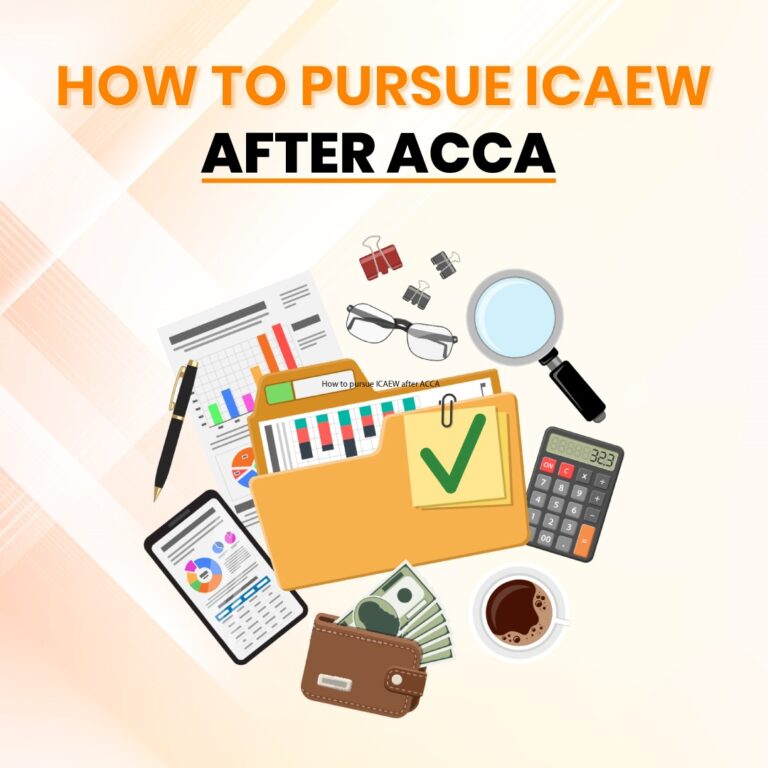“A Roadmap to ICAEW After ACCA”
Have you completed your ACCA qualification and are now thinking about the next step to accelerate your career journey by enhancing your academic worth? ICAEW after ACCA can help you enhance your professional value in the competitive financial world.
ICAEW, after availing the prestigious qualification of ACCA, is a preferred combination for aspirants who aim to build a solid career. Students are encouraged to take this study path after doing ACCA, as ICAEW’s qualification offers exemptions and a streamlined process for ACCA qualifications, members, etc.
ICAEW stands for the Institute of Chartered Accountants in England and Wales. This qualification is highly regarded and rewarded in the commonwealth countries such as the UK. Want to start this academic journey but are unaware of the process and academic obligations attached to ICAEW after ACCA? This blog will help you with the step-by-step.
Step guide to success through the ICAEW route, continue till the end to get your doubts cleared.
Step-by-Step Guide To ICAEW After ACCA:
By following the steps below to ICAEW after ACCA, you can achieve your goals with so much ease:
1: Understand The Structure of ACA:
Once you start the ICAEW journey, you are expected to have a very good understanding of the structure of the ACA. ACA consists of a range of 15 exams from different academic levels that aspirants are obliged to clear, along with gaining the required work experience of 450 days. Other than that, this qualification requires aspirants to join Ethics and Professional Skepticism training as well as Initial Professional Development (IPD). To achieve success in this academic pathway, you should be very well aware of all the obligations attached to it so that you can set clear goals/aims.
2: Check Your Eligibility For CPL:
CPL stands for Credit for prior learning; this term is used for exam exemptions for ICAEW after ACCA. Aspirants who start doing ICAEW after ACCA are eligible to apply for this exemption. ACCA-qualified professionals are eligible to get up to 12 exemptions, including all 6 certificate-level and 6 professional-level modules. On the other hand, if you are an ACCA-part qualified, then you can avail of partial exemptions that depend on whether you have passed the papers.
3: Apply For ICAEW CPL:
To apply for exemptions and make an effective timetable for the rest of the exams, students should check the number of exemptions available for students who choose ICAEW after ACCA. Hence, log in to your ICAEW’s online student portal, submit all your prior academic transcripts and certifications. Lastly, register for exemptions by paying the CPL fee, which is around £70 for each exemption.
4: Plan For the Remaining ACA Exams:
In case you are successful in availing full exemptions in about 12 exams, now you are obliged to clear the rest of 3 exams for the advanced level. These three modules include Strategic Business Management, Case Study, and Corporate Reporting.
For the remaining number of exams, you can plan a structured timetable and practice religiously; aspirants are advised not to take these exams very lightly, as these exams are more advanced and complicated than the ACCA exam; therefore, they demand more concentration and consistency.
5: Register as an ACA Student:
If you want to associate yourself with ICAEW, you will have to register as an ACA trainee or a student after getting your CPL approved. It is the most basic yet an essential step to begin the journey officially.
6: Secure a Training Agreement:
Despite doing ICAEW after ACCA, the aspirants need to secure a training agreement of relevant experience for 450 days within the previous 5 years.
The employer or trainee should be ICAEW-approved and acknowledged. It is a mandatory requirement of the qualification; therefore, overlooking the training agreement can affect your professional status.
7: Complete Ethics and Professional Development:
Even if you are doing ICAEW after ACCA and have already cleared ACCA’s Ethics and professional modules. You are still obliged to complete the Initial Professional Development, as well as the Ethics and learning Programme. These are often offered online and have the flexibility of self-paced studies.
8: Pass The Final Exams:
Prepare for the final ICAEW exams; do not take your chance to outperform for granted. Stay consistent with your studies, leverage reliable study material and tuition providers, etc. If you are willing to put in extra effort in your exams, you are advised to take mock exams and practice papers.
9: Apply For ICAEW Membership:
Once you have completed all the academic requirements of this qualification and cleared all the exams now you are now eligible to apply for Full-ICAEW membership and avail it as quickly as possible to accelerate your professional journey.
Conclusion:
Indeed, doing ICAEW after ACCA is a popular choice amongst finance and accounting aspirants who are willing to add value to their work profile. The registration process and structure seem a bit similar to that of the ACCA qualification, which can be a positive point for ACCA candidates. If you are willing to add more value to your professional and academic profile, this qualification can be a great help to you. Hence, hurry up and get yourself started.
Frequently Asked Questions (FAQs)
Q1: What are the benefits of ICAEW after ACCA?
Ans: Some of the key benefits of ICAEW after ACCA are stated below:
- Enhanced career/job opportunities
- Wider professional network
- Specialized roles
- Increased Potential Salaries
Q2: Can I do ICAEW after the ACCA qualification?
Ans: Yes, after completing ACCA, you can get yourself registered with ICAEW to begin this new journey to enhance your academic achievements and attract more career opportunities.
Q3: How does doing ICAEW after ACCA enhance your career?
Ans: The qualification helps expand your academic knowledge and makes you a desirable candidate for executive-level roles. Additionally, it supports career progression and promotions in positions that require higher professional qualifications.





